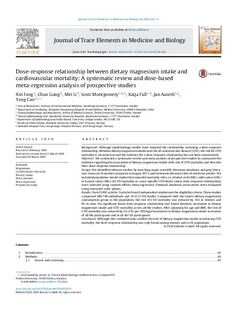| dc.contributor.author | Fang, Xin | |
| dc.contributor.author | Liang, Chun | |
| dc.contributor.author | Li, Mei | |
| dc.contributor.author | Montgomery, Scott | |
| dc.contributor.author | Fall, Katja | |
| dc.contributor.author | Aaseth, Jan | |
| dc.contributor.author | Cao, Yang | |
| dc.date.accessioned | 2017-02-15T10:19:01Z | |
| dc.date.available | 2017-02-15T10:19:01Z | |
| dc.date.issued | 2016 | |
| dc.identifier.issn | 0946-672X | |
| dc.identifier.uri | http://hdl.handle.net/11250/2430870 | |
| dc.description | This is an Open Access article licensed under the Creative Commons Attribution License 3.0 (CC BY 3.0) and originally published in Nutrients. You can access the article by following this link: http://dx.doi.org/10.3390/nu8110739 | |
| dc.description | Dette er en vitenskapelig, fagfellevurdert artikkel som opprinnelig ble publisert i Nutrients. Artikkelen er publisert under lisensen Creative Commons Attribution License 3.0 (CC BY 3.0). Du kan også få tilgang til artikkelen ved å følge denne lenken: http://dx.doi.org/10.3390/nu8110739 | |
| dc.description.abstract | Background Although epidemiology studies have reported the relationship, including a dose-response relationship, between dietary magnesium intake and risk of cardiovascular disease (CVD), the risk for CVD mortality is inconclusive and the evidence for a dose-response relationship has not been summarized. Objective We conducted a systematic review and meta-analysis of prospective studies to summarize the evidence regarding the association of dietary magnesium intake with risk of CVD mortality and describe their dose-response relationship. Design We identified relevant studies by searching major scientific literature databases and grey literature resources from their inception to August 2015, and reviewed references lists of retrieved articles. We included population-based studies that reported mortality risks, i.e. relative risks (RRs), odds ratios (ORs) or hazard ratios (HRs) of CVD mortality or cause-specific CVD death. Linear dose-response relationships were assessed using random-effects meta-regression. Potential nonlinear associations were evaluated using restricted cubic splines. Results Out of 3002 articles, 9 articles from 8 independent studies met the eligibility criteria. These studies comprised 449,748 individuals and 10,313 CVD deaths. Compared with the lowest dietary magnesium consumption group in the population, the risk of CVD mortality was reduced by 16% in women and 8% in men. No significant linear dose-response relationship was found between increment in dietary magnesium intake and CVD mortality across all the studies. After adjusting for age and BMI, the risk of CVD mortality was reduced by 24–25% per 100 mg/d increment in dietary magnesium intake in women of all the participants and in all the US participants. Conclusion Although the combined data confirm the role of dietary magnesium intake in reducing CVD mortality, the dose-response relationship was only found among women and in US population | nb_NO |
| dc.language.iso | eng | nb_NO |
| dc.rights | Attribution-NonCommercial-NoDerivatives 4.0 Internasjonal | * |
| dc.rights.uri | http://creativecommons.org/licenses/by-nc-nd/4.0/deed.no | * |
| dc.title | Dose-response relationship between dietary magnesium intake and cardiovascular mortality: A systematic review and dose-based meta-regression analysis of prospective studies | nb_NO |
| dc.type | Journal article | nb_NO |
| dc.type | Peer reviewed | nb_NO |
| dc.source.journal | Journal of Trace Elements in Medicine and Biology | nb_NO |

